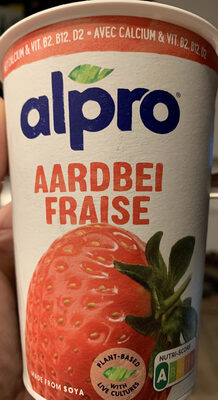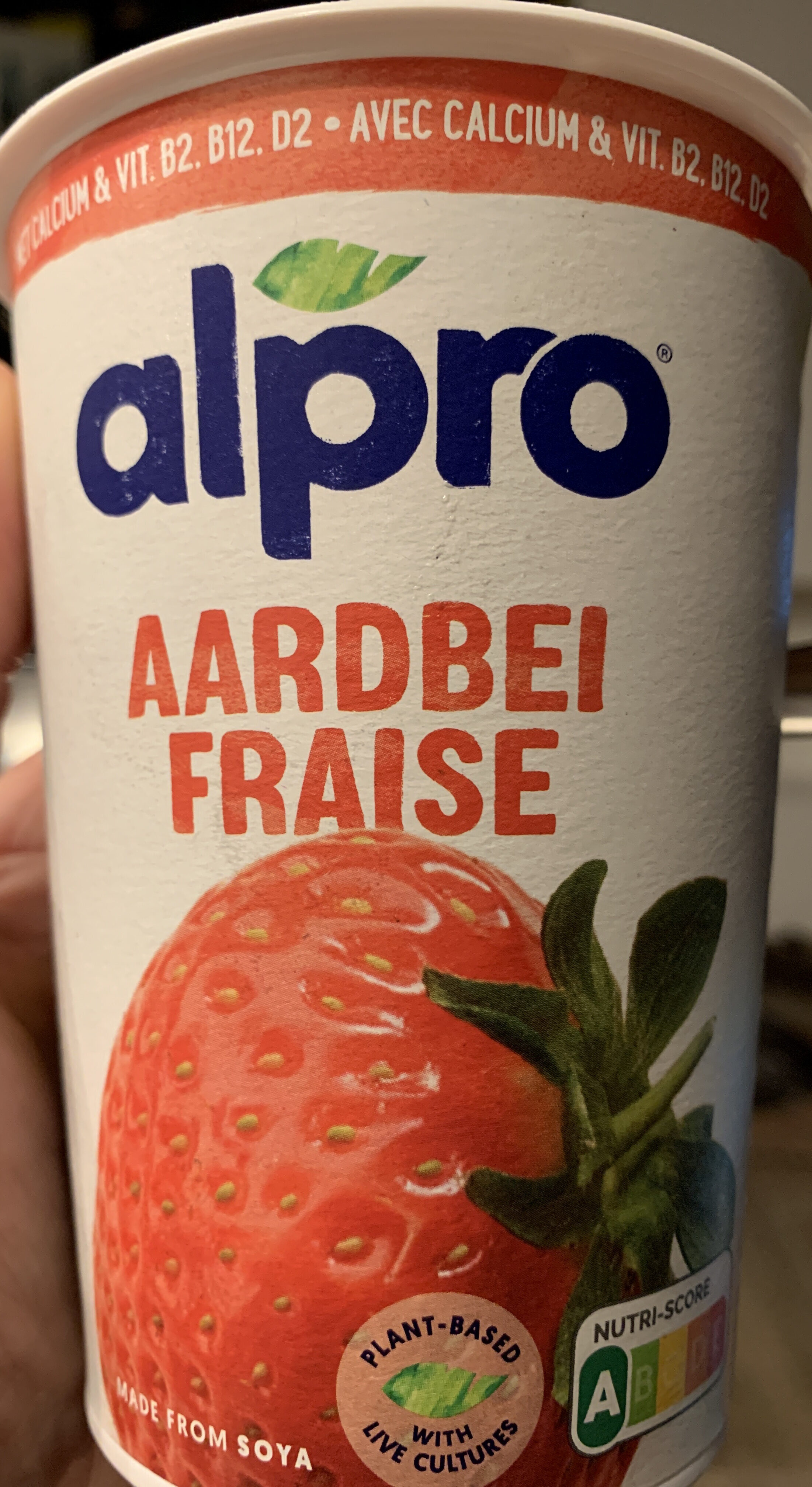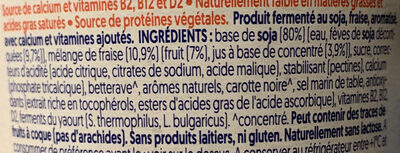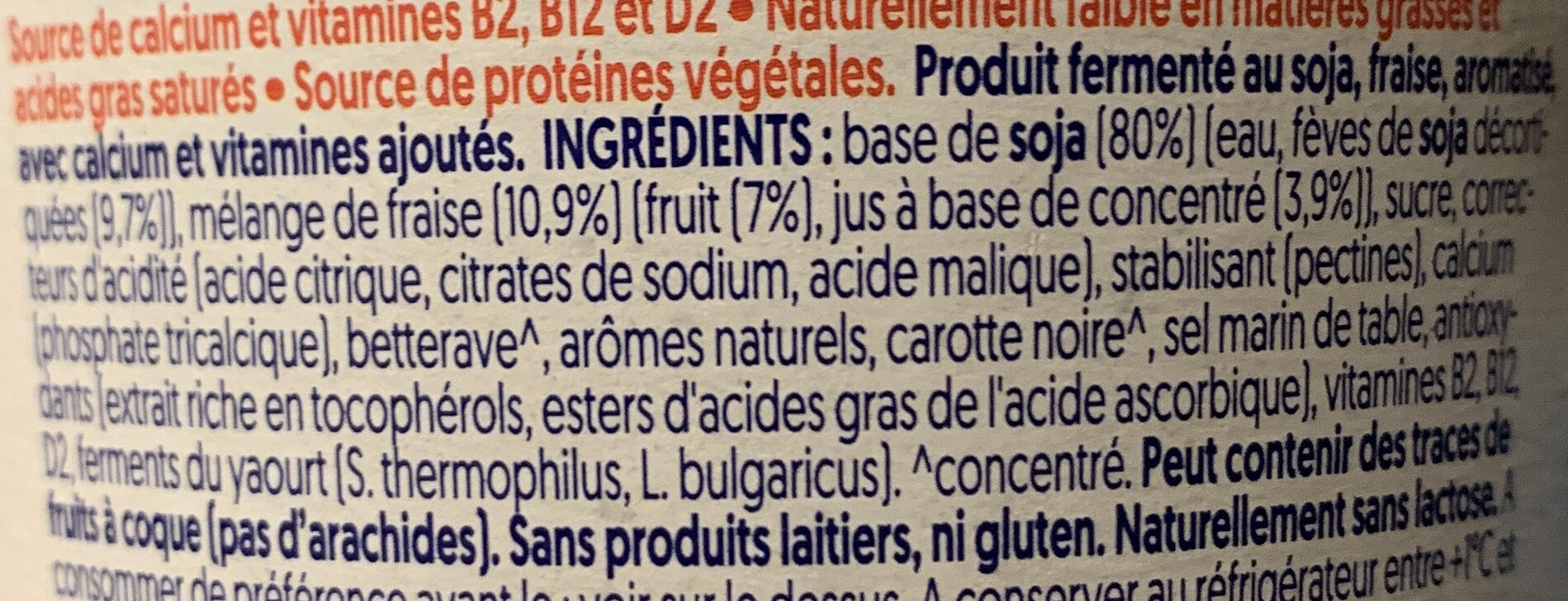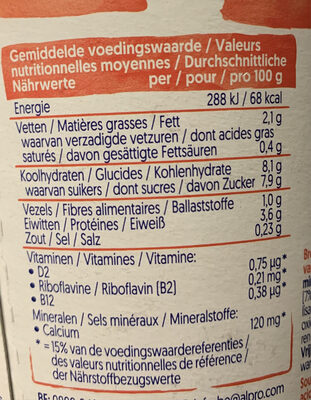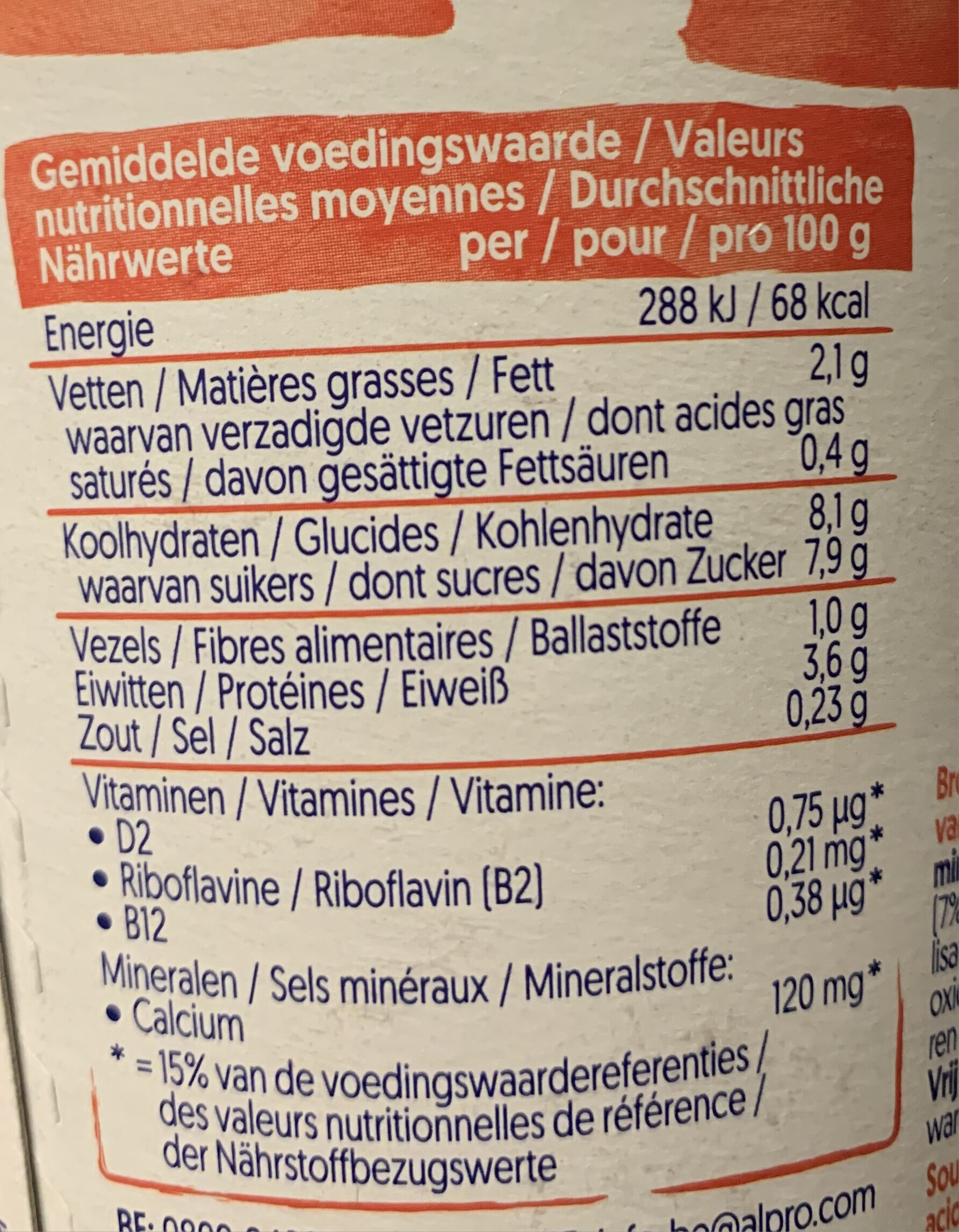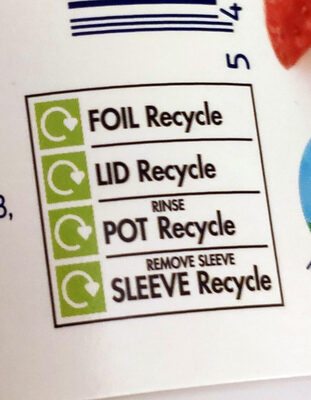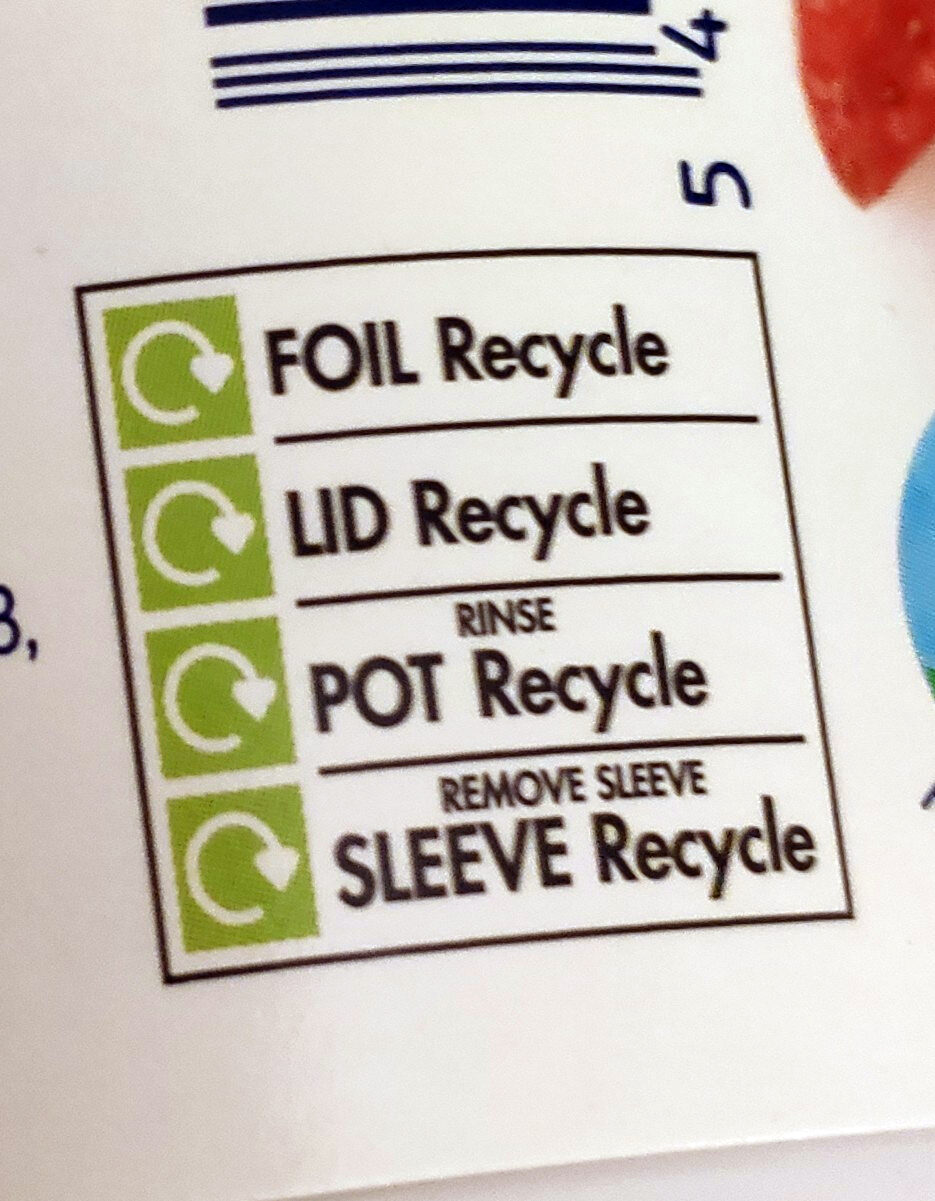Help us make food transparency the norm!
As a non-profit organization, we depend on your donations to continue informing consumers around the world about what they eat.
The food revolution starts with you!
Soja à la fraise - Alpro - 500 g
Soja à la fraise - Alpro - 500 g
This product page is not complete. You can help to complete it by editing it and adding more data from the photos we have, or by taking more photos using the app for Android or iPhone/iPad. Thank you!
×
Barcode: 5411188114536 (EAN / EAN-13)
Common name: Fermented soya product with strawberry, with added calcium and vitamins
Quantity: 500 g
Packaging: Plastic, Metal, Paper, Pp-polypropylene, Recyclable Metals, Aluminium, Cardboard, Paperboard
Brands: Alpro
Categories: Plant-based foods and beverages, Fermented foods, Dairy substitutes, Desserts, Non-dairy desserts, Non-dairy fermented foods, Non-dairy yogurts, Soy milk yogurts, Fruit soy yogurts, Strawberry soy yogurts
Labels, certifications, awards:
Low or no fat, Low fat, No gluten, Vegetarian, No GMOs, Source of proteins, Vegan, 100% vegetable, Calcium source, Contains soy, Do not freeze, European Vegetarian Union, European Vegetarian Union Vegan, High proteins, No lactose, Nutriscore, Nutriscore Grade A, Rich in vegetable protein, The Vegan Society, Without addition of dairy products


Manufacturing or processing places: Wevelgem
Link to the product page on the official site of the producer: https://www.alpro.com/uk/products/plant-...
Stores: Sainsbury's, Tesco Extra, Lidl, Kaufland, REWE
Countries where sold: Belgium, France, Germany, Ireland, United Kingdom
Matching with your preferences
Health
Ingredients
-
31 ingredients
soy base (80%) (water, shelled soybeans (9.7%), strawberry mixture (10.9%) (fruit (7%), juice from concentrate (3.9%), sugar, acidity factors (citric acid, sodium citrates, malic acid), stabilizer (pectins), calcium tricalcium phosphate), beet concentrate, natural flavourings, black carrot concentrate, quot, table sea salt, antioxidants extract rich in tocopherols, fatty acid esters of ascorbic acid), vitamins b2, b12, d2, yoghurt ferments (s, thermophilus, l, bulgaricus), may contain traces of nutsAllergens: SoybeansTraces: Nuts
Food processing
-
Ultra processed foods
Elements that indicate the product is in the 4 - Ultra processed food and drink products group:
- Additive: E440 - Pectins
- Ingredient: Flavouring
Food products are classified into 4 groups according to their degree of processing:
- Unprocessed or minimally processed foods
- Processed culinary ingredients
- Processed foods
- Ultra processed foods
The determination of the group is based on the category of the product and on the ingredients it contains.
Additives
-
E296 - Malic acid
Malic acid: Malic acid is an organic compound with the molecular formula C4H6O5. It is a dicarboxylic acid that is made by all living organisms, contributes to the pleasantly sour taste of fruits, and is used as a food additive. Malic acid has two stereoisomeric forms -L- and D-enantiomers-, though only the L-isomer exists naturally. The salts and esters of malic acid are known as malates. The malate anion is an intermediate in the citric acid cycle.Source: Wikipedia
-
E304 - Fatty acid esters of ascorbic acid
Ascorbyl palmitate: Ascorbyl palmitate is an ester formed from ascorbic acid and palmitic acid creating a fat-soluble form of vitamin C. In addition to its use as a source of vitamin C, it is also used as an antioxidant food additive -E number E304-. It is approved for use as a food additive in the EU, the U.S., Canada, Australia, and New Zealand.Ascorbyl palmitate is known to be broken down -through the digestive process- into ascorbic acid and palmitic acid -a saturated fatty acid- before being absorbed into the bloodstream. Ascorbyl palmitate is also marketed as "vitamin C ester".Source: Wikipedia
-
E330 - Citric acid
Citric acid is a natural organic acid found in citrus fruits such as lemons, oranges, and limes.
It is widely used in the food industry as a flavor enhancer, acidulant, and preservative due to its tart and refreshing taste.
Citric acid is safe for consumption when used in moderation and is considered a generally recognized as safe (GRAS) food additive by regulatory agencies worldwide.
-
E331 - Sodium citrates
Sodium citrate: Sodium citrate may refer to any of the sodium salts of citrate -though most commonly the third-: Monosodium citrate Disodium citrate Trisodium citrateThe three forms of the salt are collectively known by the E number E331. Sodium citrates are used as acidity regulators in food and drinks, and also as emulsifiers for oils. They enable cheeses to melt without becoming greasy.Source: Wikipedia
-
E440 - Pectins
Pectins (E440) are natural carbohydrates, predominantly found in fruits, that act as gelling agents in the food industry, creating the desirable jelly-like texture in jams, jellies, and marmalades.
Pectins stabilize and thicken various food products, such as desserts, confectioneries, and beverages, ensuring a uniform consistency and quality.
Recognized as safe by various health authorities, pectins have been widely used without notable adverse effects when consumed in typical dietary amounts.
Ingredients analysis
-
May contain palm oil
Ingredients that may contain palm oil: E304
-
Vegan
No non-vegan ingredients
Unrecognized ingredients: fr:base-de-soja, fr:melange-de-fraise, fr:comec-teurs-d-acidite, fr:calcium-phosphate-tricalcique, fr:quot, Vitamin b12, fr:s, fr:thermophilus, fr:lSome ingredients could not be recognized.
We need your help!
You can help us recognize more ingredients and better analyze the list of ingredients for this product and others:
- Edit this product page to correct spelling mistakes in the ingredients list, and/or to remove ingredients in other languages and sentences that are not related to the ingredients.
- Add new entries, synonyms or translations to our multilingual lists of ingredients, ingredient processing methods, and labels.
If you would like to help, join the #ingredients channel on our Slack discussion space and/or learn about ingredients analysis on our wiki. Thank you!
-
Vegetarian
No non-vegetarian ingredients detected
Unrecognized ingredients: fr:base-de-soja, fr:melange-de-fraise, fr:comec-teurs-d-acidite, fr:calcium-phosphate-tricalcique, fr:quot, Vitamin b12, fr:s, fr:thermophilus, fr:lSome ingredients could not be recognized.
We need your help!
You can help us recognize more ingredients and better analyze the list of ingredients for this product and others:
- Edit this product page to correct spelling mistakes in the ingredients list, and/or to remove ingredients in other languages and sentences that are not related to the ingredients.
- Add new entries, synonyms or translations to our multilingual lists of ingredients, ingredient processing methods, and labels.
If you would like to help, join the #ingredients channel on our Slack discussion space and/or learn about ingredients analysis on our wiki. Thank you!
-
Details of the analysis of the ingredients
We need your help!
Some ingredients could not be recognized.
We need your help!
You can help us recognize more ingredients and better analyze the list of ingredients for this product and others:
- Edit this product page to correct spelling mistakes in the ingredients list, and/or to remove ingredients in other languages and sentences that are not related to the ingredients.
- Add new entries, synonyms or translations to our multilingual lists of ingredients, ingredient processing methods, and labels.
If you would like to help, join the #ingredients channel on our Slack discussion space and/or learn about ingredients analysis on our wiki. Thank you!
fr: Base de soja 80%, eau, fèves de soja 9.7%, mélange de fraise 10.9% (fruit 7%, jus 3.9%, sucre, comec teurs d'acidité (acide citrique, citrates de sodium, acide malique), stabilisant (pectines), calcium phosphate tricalcique), concentré de betterave, arômes naturels, carotte noire, quot, sel marin de table, antioxydants (extrait riche en tocophérols), esters d'acides gras de l'acide ascorbique, vitamines, vitamine B2, vitamine B12, vitamine D2, ferments du yaourt (S, thermophilus, L, bulgaricus)- Base de soja -> fr:base-de-soja - percent: 80
- eau -> en:water - vegan: yes - vegetarian: yes - ciqual_food_code: 18066
- fèves de soja -> en:soya-bean - vegan: yes - vegetarian: yes - ciqual_food_code: 20901 - percent: 9.7
- mélange de fraise -> fr:melange-de-fraise - percent: 10.9
- fruit -> en:fruit - vegan: yes - vegetarian: yes - percent: 7
- jus -> en:juice - vegan: maybe - vegetarian: maybe - percent: 3.9
- sucre -> en:sugar - vegan: yes - vegetarian: yes - ciqual_proxy_food_code: 31016
- comec teurs d'acidité -> fr:comec-teurs-d-acidite
- acide citrique -> en:e330 - vegan: yes - vegetarian: yes
- citrates de sodium -> en:e331 - vegan: yes - vegetarian: yes
- acide malique -> en:e296 - vegan: yes - vegetarian: yes
- stabilisant -> en:stabiliser
- pectines -> en:e440a - vegan: yes - vegetarian: yes
- calcium phosphate tricalcique -> fr:calcium-phosphate-tricalcique
- concentré de betterave -> fr:concentre-de-betterave - vegan: yes - vegetarian: yes - ciqual_proxy_food_code: 20091
- arômes naturels -> en:natural-flavouring - vegan: maybe - vegetarian: maybe
- carotte noire -> en:black-carrot - vegan: yes - vegetarian: yes - ciqual_food_code: 20009
- quot -> fr:quot
- sel marin de table -> en:sea-salt - vegan: yes - vegetarian: yes - ciqual_food_code: 11082
- antioxydants -> en:antioxidant
- extrait riche en tocophérols -> en:e306 - vegan: yes - vegetarian: yes
- esters d'acides gras de l'acide ascorbique -> en:e304 - vegan: maybe - vegetarian: maybe - from_palm_oil: maybe
- vitamines -> en:vitamins - vegan: yes - vegetarian: yes
- vitamine B2 -> en:e101 - vegan: maybe - vegetarian: yes
- vitamine B12 -> en:vitamin-b12
- vitamine D2 -> en:ergocalciferol - vegan: yes - vegetarian: yes
- ferments du yaourt -> en:yogurt-cultures - vegan: maybe - vegetarian: yes
- S -> fr:s
- thermophilus -> fr:thermophilus
- L -> fr:l
- bulgaricus -> en:lactobacillus-bulgaricus - vegan: maybe - vegetarian: yes
Nutrition
-
Very good nutritional quality
⚠ ️Warning: the amount of fruits, vegetables and nuts is not specified on the label, it was estimated from the list of ingredients: 16This product is not considered a beverage for the calculation of the Nutri-Score.
Positive points: 3
- Proteins: 2 / 5 (value: 3.6, rounded value: 3.6)
- Fiber: 1 / 5 (value: 1, rounded value: 1)
- Fruits, vegetables, nuts, and colza/walnut/olive oils: 0 / 5 (value: 16.7, rounded value: 16.7)
Negative points: 2
- Energy: 0 / 10 (value: 288, rounded value: 288)
- Sugars: 1 / 10 (value: 7.9, rounded value: 7.9)
- Saturated fat: 0 / 10 (value: 0.4, rounded value: 0.4)
- Sodium: 1 / 10 (value: 92, rounded value: 92)
The points for proteins are counted because the negative points are less than 11.
Nutritional score: (2 - 3)
Nutri-Score:
-
Nutrient levels
-
Fat in low quantity (2.1%)
What you need to know- A high consumption of fat, especially saturated fats, can raise cholesterol, which increases the risk of heart diseases.
Recommendation: Limit the consumption of fat and saturated fat- Choose products with lower fat and saturated fat content.
-
Saturated fat in low quantity (0.4%)
What you need to know- A high consumption of fat, especially saturated fats, can raise cholesterol, which increases the risk of heart diseases.
Recommendation: Limit the consumption of fat and saturated fat- Choose products with lower fat and saturated fat content.
-
Sugars in moderate quantity (7.9%)
What you need to know- A high consumption of sugar can cause weight gain and tooth decay. It also augments the risk of type 2 diabetes and cardio-vascular diseases.
Recommendation: Limit the consumption of sugar and sugary drinks- Sugary drinks (such as sodas, fruit beverages, and fruit juices and nectars) should be limited as much as possible (no more than 1 glass a day).
- Choose products with lower sugar content and reduce the consumption of products with added sugars.
-
Salt in low quantity (0.23%)
What you need to know- A high consumption of salt (or sodium) can cause raised blood pressure, which can increase the risk of heart disease and stroke.
- Many people who have high blood pressure do not know it, as there are often no symptoms.
- Most people consume too much salt (on average 9 to 12 grams per day), around twice the recommended maximum level of intake.
Recommendation: Limit the consumption of salt and salted food- Reduce the quantity of salt used when cooking, and don't salt again at the table.
- Limit the consumption of salty snacks and choose products with lower salt content.
-
-
Nutrition facts
Nutrition facts As sold
for 100 g / 100 mlCompared to: Fruit soy yogurts Energy 288 kj
(68 kcal)-9% Fat 2.1 g +2% Saturated fat 0.4 g +19% Carbohydrates 8.1 g -16% Sugars 7.9 g -13% Lactose 0 g Fiber 1 g +30% Proteins 3.6 g -2% Salt 0.23 g +55% Vitamin D 750 µg +84,838% Vitamin B2 (Riboflavin) 0.21 mg Vitamin B12 (cobalamin) 380 µg +104,296% Calcium 120 mg +12% Fruits‚ vegetables‚ nuts and rapeseed‚ walnut and olive oils (estimate from ingredients list analysis) 16.7 %
Environment
-
Eco-Score A - Very low environmental impact
The Eco-Score is an experimental score that summarizes the environmental impacts of food products.→ The Eco-Score was initially developped for France and it is being extended to other European countries. The Eco-Score formula is subject to change as it is regularly improved to make it more precise and better suited to each country.Life cycle analysis
-
Average impact of products of the same category: A (Score: 96/100)
Category: Soy dessert, w fruits, refrigerated
Category: Soy dessert, w fruits, refrigerated
- PEF environmental score: 0.12 (the lower the score, the lower the impact)
- including impact on climate change: 0.86 kg CO2 eq/kg of product
Stage Impact Agriculture
31.5 %Processing
30.7 %Packaging
12.9 %Transportation
15.4 %Distribution
7.5 %Consumption
2.0 %
Bonuses and maluses
-
Missing origins of ingredients information
Malus: -5
⚠ ️ The origins of the ingredients of this product are not indicated.
If they are indicated on the packaging, you can modify the product sheet and add them.
If you are the manufacturer of this product, you can send us the information with our free platform for producers.
-
Packaging with a medium impact
Malus: -11
Shape Material Recycling Impact 1 Pot PP 5 - Polypropylene Recycle High 1 Seal Metal Recycle High 1 Lid RPET - Transparent Recycle High 1 Sleeve Cardboard Recycle Low ⚠ ️ The information about the packaging of this product is not sufficiently precise (exact shapes and materials of all components of the packaging).⚠ ️ For a more precise calculation of the Eco-Score, you can modify the product page and add them.
If you are the manufacturer of this product, you can send us the information with our free platform for producers.
Eco-Score for this product
-
Impact for this product: A (Score: 80/100)
Product: Soja à la fraise - Alpro - 500 g
Life cycle analysis score: 96
Sum of bonuses and maluses: -16
Final score: 80/100
-
Carbon footprint
-
Equal to driving 0.4 km in a petrol car
86 g CO² per 100g of product
The carbon emission figure comes from ADEME's Agribalyse database, for the category: Soy dessert, w fruits, refrigerated (Source: ADEME Agribalyse Database)
Stage Impact Agriculture
17.9 %Processing
28.4 %Packaging
21.6 %Transportation
26.9 %Distribution
4.4 %Consumption
0.8 %
Packaging
-
Packaging with a medium impact
-
Packaging parts
1 x Pot (PP 5 - Polypropylene: 8.86 g)
1 x Seal (Metal: 0.77 g)
1 x Lid (RPET - Transparent: 3.09 g)
1 x Sleeve (Cardboard: 7.76 g)
-
Packaging materials
Material % Packaging weight Packaging weight per 100 g of product Paper or cardboard 37.9% 7.76 g 1.6 g Plastic 58.3% 11.95 g 2.4 g Metal 3.8% 0.77 g 0.2 g Total 100% 20.48 g 4.1 g
-
Transportation
-
Origins of ingredients
Missing origins of ingredients information
⚠ ️ The origins of the ingredients of this product are not indicated.
If they are indicated on the packaging, you can modify the product sheet and add them.
If you are the manufacturer of this product, you can send us the information with our free platform for producers.Add the origins of ingredients for this product Add the origins of ingredients for this product
Report a problem
-
Incomplete or incorrect information?
Category, labels, ingredients, allergens, nutritional information, photos etc.
If the information does not match the information on the packaging, please complete or correct it. Open Food Facts is a collaborative database, and every contribution is useful for all.
Data sources
Product added on by openfoodfacts-contributors
Last edit of product page on by inf.
Product page also edited by alia, anticultist, date-limite-app, ecoscore-impact-estimator, ewaca, foodvisor, gabrielbe, gala-nafikova, grumpf, heuwerk, itsjustruby, jm0804, kguest, kiliweb, lbe-dev, moon-rabbit, naruyoko, off.7f6b26cf-91cf-4b76-904c-95bb752f0da9, packbot, planteuser, product-scanner, roboto-app, scanbot, smoothie-app, sne1991, spotter, swipe-studio, yuka.SDdCWlNiOEFwTVkyeGNZOC9SZUV5czRrN3JpekREcWNEZE1xSVE9PQ, yuka.sY2b0xO6T85zoF3NwEKvlmxlbejapGz1GRrmvFSoxtGjf43IZctJ_pLkK6s.
Last check of product page on by moon-rabbit.
